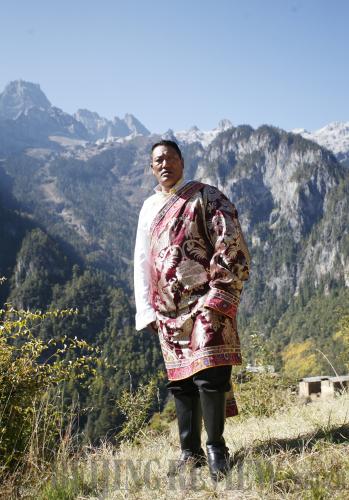|
 |
|
TOWERING AMBITION: Sonam Dhundrup stands at the canyon of Balagezong (COURTESY SONAM DHUNDRUP) |
Despite the difficulties, Sonam Dhundrup said that he believed there was a lot he could get done by himself. Putting faith in the knowledge of the mountains he had acquired since childhood, he walked more than 40,000 km within two years, surveying the terrain, making a plan and trying to find techniques to build a road amidst steep cliffs, deep gullies and sharp turns.
To raise money, Sonam Dhundrup sold his restaurant, hardware shop and properties, and borrowed money from banks, credit companies and almost all of his family members and friends. Finally, he incurred a debt of more than 100 million yuan ($16.2 million), including 14 million yuan ($2.27 million) from Lobsang Tashi.
In September 2007, construction of the road linking National Highway 214 to Bala commenced.
Before reaching Bala, the 6.5-meter-wide and 35-km-long road passes through four villages inhabited by Tibetans, where some houses had to be relocated and trees and crops be moved away to make room for the road. Sonam Dhundrup offered the highest possible compensation to affected villagers to gain their support.
In the same year, Sonam Dhundrup also raised 7 million yuan ($1.14 million) erecting a 34.8-km-long transmission line, bringing electricity to Bala and four neighboring villages.
On January 1, 2008, Bala's villagers celebrated having access to a hard-surfaced road, electricity and telephone services for the very first time. They were so excited that some of them kept making phone calls with their relatives and friends, and others switched on and off the electric lights again and again to experience the sheer joy of lighting up the village. "Tears welled in my eyes," Sonam Dhundrup said, describing his joy in his success.
In June 2009, Sonam Dhundrup spent an additional 1.28 million yuan ($207,620) on building a bridge above the Gangqu River. Now it only takes a mere one and a half hours to drive from Bala to the county seat of Shangri-La.
Prosperity for all
Xishan Mountain is a major tourist attraction in Kunming, the provincial capital of Yunnan. After visiting there in 1999, Sonam Dhundrup was seized by a desire to establish a tourism in his hometown. Although isolated, the canyon of Balagezong resembled a mysterious earthly paradise, and he thought developing tourism might help villagers in Bala overcome poverty. In that year, he registered a company to develop tourist resources in the canyon of Balagezong.
After years of planning, environmental impact assessment and feasibility studies, the Balagezong National Park funded by Sonam Dhundrup was opened in 2006, taking its place as one of the five national parks in Deqen Tibetan Autonomous Prefecture, which administers Shangri-La County.
To improve the life of Bala's villagers, Sonam Dhundrup provided financial subsidies ranging from 45,000 yuan ($7,299) to 180,000 yuan ($29,196) for each household in the village, supporting them as they relocated from the remote mountains to two new villages with easy transport facilities near Gangqu River—Shuizhuang and Nalang. His company rented the villagers' land to develop ecological agriculture and restored their old houses in strict accordance with the traditional architectural style of the locality. The houses have all been transformed into hotels so that tourists living in them can experience Tibetan culture firsthand. Each household in Bala can receive a rent of about 15,000 yuan ($2,433) each year for their former domiciles.
Sonam Dhundrup also supports his fellow villagers in operating farms and actively purchases their products. Currently, each local household can earn an average of 50,000 yuan ($8,110) each year from these businesses. Local farmers can also be contracted for maintenance projects for the highway, with each family earning about 7,000 yuan ($1,136) each year.
Kelsang Tsering, 30, now works as a tour guide in the Balagezong National Park, he earns 4,000 yuan ($649) each month. "With this park, we young people don't need to leave our native land and I can make money while still staying with my parents," he told Beijing Review.
"Few people in the world can realize their dream. Despite hardships, I've finally managed to do it," said Sonam Dhundrup.
Email us at: wangjun@bjreview.com | 